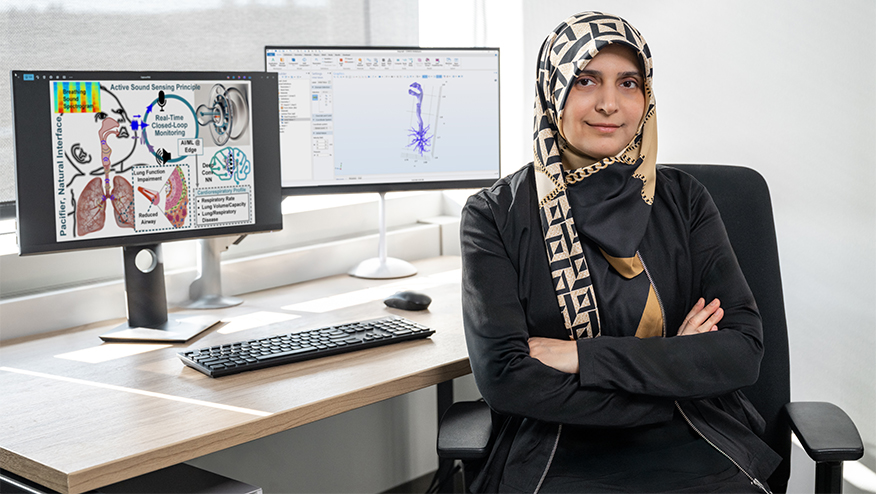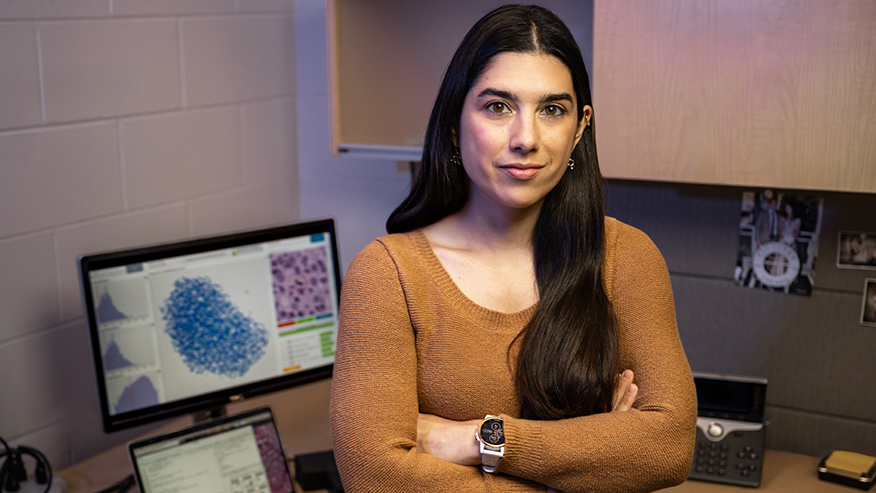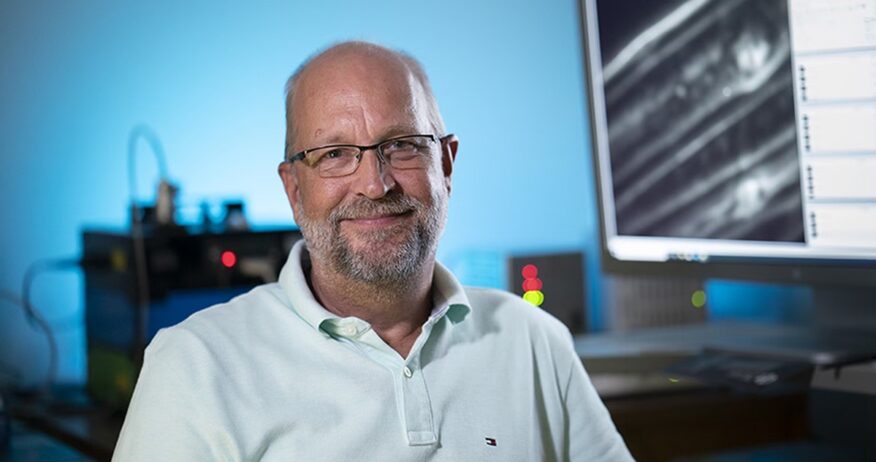Purdue to open Accessible Precision Audiology Research Center in Indianapolis
The new facility at 16 Tech Innovation District will address hearing health needs, with a focus on underserved groups

Purdue graduate student Natalie Seidl tests a subject’s hearing in a sound-attenuating booth. Purdue’s audiology graduate program was ranked No. 8 in the 2024-25 U.S. News & World Report Best Graduate Schools national rankings. (Photo provided by Purdue Department of Speech, Language, and Hearing Sciences)
INDIANAPOLIS — Leveraging Purdue’s internationally recognized expertise in audiology and auditory neuroscience and AI-driven data analytics, Purdue University announced plans for the new Accessible Precision Audiology Research Center (APARC) in Indianapolis on Wednesday (May 1). The community-facing center will address the urgent need for accessible precision audiology, especially among underserved populations in Indiana. It will be housed in the 16 Tech Innovation District, the city’s destination for innovation and entrepreneurship, and be adjacent to Purdue University in Indianapolis, the urban extension campus that launches July 1.
By establishing the APARC in Indianapolis at 16 Tech, Purdue aims to reach diverse populations in Indiana with information about the many health and economic burdens associated with untreated hearing loss, along with providing research-grade standardized hearing assessments for community members. An open-source data hub of standardized hearing measures for researchers using AI-enabled analysis tools will create more testing and treatment capabilities.
“Purdue’s new Accessible Precision Audiology Research Center in Indianapolis will leverage our leadership in both AI and the speech, language and hearing sciences,” said Karen Plaut, executive vice president for research. “Using AI to better analyze measures of hearing loss, the goal of this research center is to develop better testing methods and improve the hearing and overall well-being for people living in central Indiana and beyond.”
ADDITIONAL INFORMATION
- Purdue’s Manufacturing and Materials Research Laboratories announces new Indianapolis presence
- Purdue University, High Alpha partner to house programs in downtown Indianapolis
- Purdue University in Indianapolis: Launching Purdue’s first comprehensive urban campus and forming America’s Hard-Tech Corridor
The faculty team leading APARC illustrates the interdisciplinary approaches that are required to meet today’s grand challenges. The team is led by Michael Heinz, associate head for research in the Department of Speech, Language, and Hearing Sciences (SLHS), along with fellow SLHS faculty Jennifer Simpson, Maureen Shader and Josh Alexander, as well as Ananth Garma in the Department of Computer Science and Edward Bartlett in the Department of Biological Sciences. The center is supported by Purdue’s Office of Research and the Office of the Provost and leverages several significant grants from the National Institutes of Health.
“I am especially proud that funding for APARC came about following a research proposal by faculty members during Purdue’s life and health sciences summit in 2023,” Plaut said.
Untreated hearing loss is associated with increased cognitive decline, dementia, social isolation, falls and mental health disorders. Additional comorbidities of hearing loss include cardiovascular disease and diabetes. For people with untreated hearing loss, health care costs are 46% higher and inpatient stays occur 1.5 times more often than for those without hearing loss.
Overcoming these health and economic burdens is made even more difficult by limited access to quality audiological care. In the U.S. today, only one audiologist exists for every 14,000 people, and over 15% of American adults nationwide — around 40 million people — have trouble hearing. This highlights the urgent need for precision audiology to support targeted treatment (for example, hearing aids, cochlear implants or, ultimately, biopharmaceutical approaches), rehabilitation, and identification of population and individual-specific risk factors.
“We are grateful for Purdue’s support to help synergize our team’s expertise in auditory neuroscience, clinical audiology and data analytics to address the significant issue of untreated hearing loss, which has numerous societal health and economic implications,” Heinz said. “Our Indianapolis presence within the innovation hub in the 16 Tech Innovation District, adjacent to the AMP artisan marketplace and food hall, provides a unique opportunity for us to establish APARC in a community-based ecosystem that includes many other initiatives aimed at accelerating transformative health solutions for central Indiana and beyond.”
At the new APARC in Indianapolis, researchers will be looking for innovative ways to address challenges associated with hearing loss, especially in low-resource urban and rural communities in the state. Indiana-specific populations with elevated risk for untreated hearing loss include farmers, Indianapolis Motor Speedway workers and fans, and those with significant health disparities residing in underserved neighborhoods. The APARC is the latest example of how Purdue is expanding its presence in central Indiana by applying significant education, instruction and research efforts to this real-life issue at 16 Tech, where world-changing discoveries and economic opportunities are being created right in the heart of Indiana’s capital city.
“APARC is a great example of an innovative program that is improving patient outcomes through technology,” said Emily Krueger, president and CEO of 16 Tech Community Corp., the nonprofit manager of the innovation district. “By locating in 16 Tech, APARC joins a growing cluster of health tech and med tech companies that have access to resources that help them scale and the diverse communities they aim to serve.”
Purdue’s Department of Speech, Language, and Hearing Sciences in the College of Health and Human Sciences is highly recognized worldwide for its undergraduate and two clinical graduate and PhD programs. The Doctor of Audiology program ranked No. 8 in the 2024-25 U.S. News and World Report Best Graduate Schools rankings due to the exceptional work of the clinical and academic faculty, who promote evidence-based practice with a deep scientific foundation.
The overarching goal of the college is to positively impact people’s behavior, health and quality of life, which aligns with the needs of patients and Purdue students.
About Purdue University in Indianapolis
Purdue University in Indianapolis is a new, fully integrated extension of the West Lafayette campus, expanding the academic rigor and accessible excellence that Purdue is known for to central Indiana. As the state’s only public top 10 university, most trusted university and most innovative university, Purdue is focused and committed to strengthening its presence in Indiana’s industrial and technological center. Purdue University in Indianapolis will create an innovative, STEM-based collegiate experience by connecting future-ready Purdue students and faculty in Indianapolis to local businesses to accelerate Indiana’s STEM pipeline and tech ecosystem, fueling impact for our region and the world. Realignment of the existing IUPUI partnership will be completed by the start of the fall semester in 2024. Learn more about Purdue’s latest giant leap at https://www.purdue.edu/campuses/indianapolis/.
About 16 Tech
Opened in 2020, the 16 Tech Innovation District is a growing destination for innovation and entrepreneurship and a driver of the tech enablement of the life sciences and advanced manufacturing industries key to Indiana’s economy. Connected to diverse neighborhoods in downtown Indianapolis and intentionally resourced with facilities and programs to foster innovation, 16 Tech is home to three buildings with a variety of office, wet- and dry-lab spaces and makerspaces, and 200-plus innovation-related entities that employ more than 800 people. At full build-out, 16 Tech anticipates more than 2 million square feet of innovation-related space that support 3,000 jobs.
Writer/Media contact: Derek Schultz, dcschultz@purdue.edu
Sources: Michael Heinz aparc@purdue.edu, Karen Plaut, Emily Krueger



